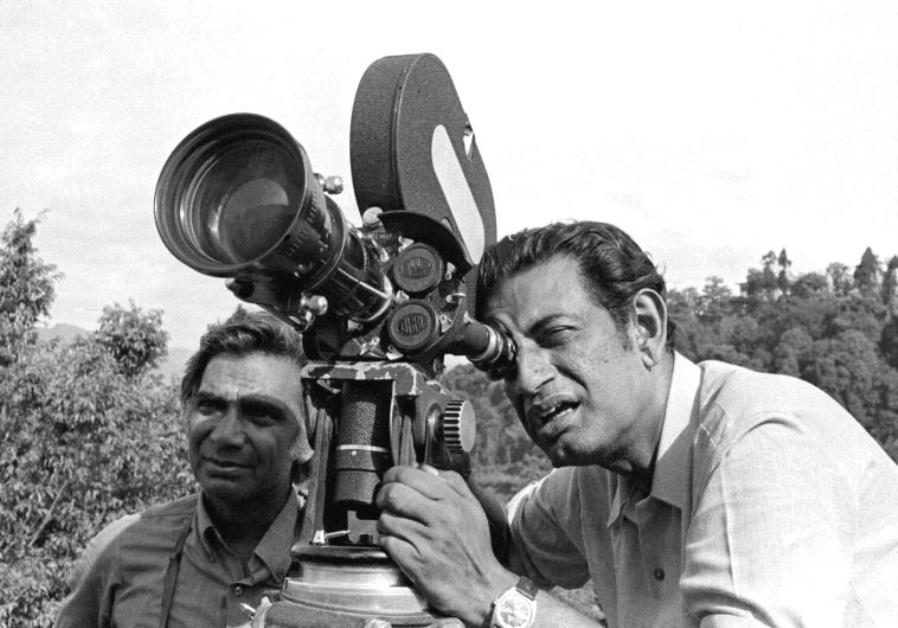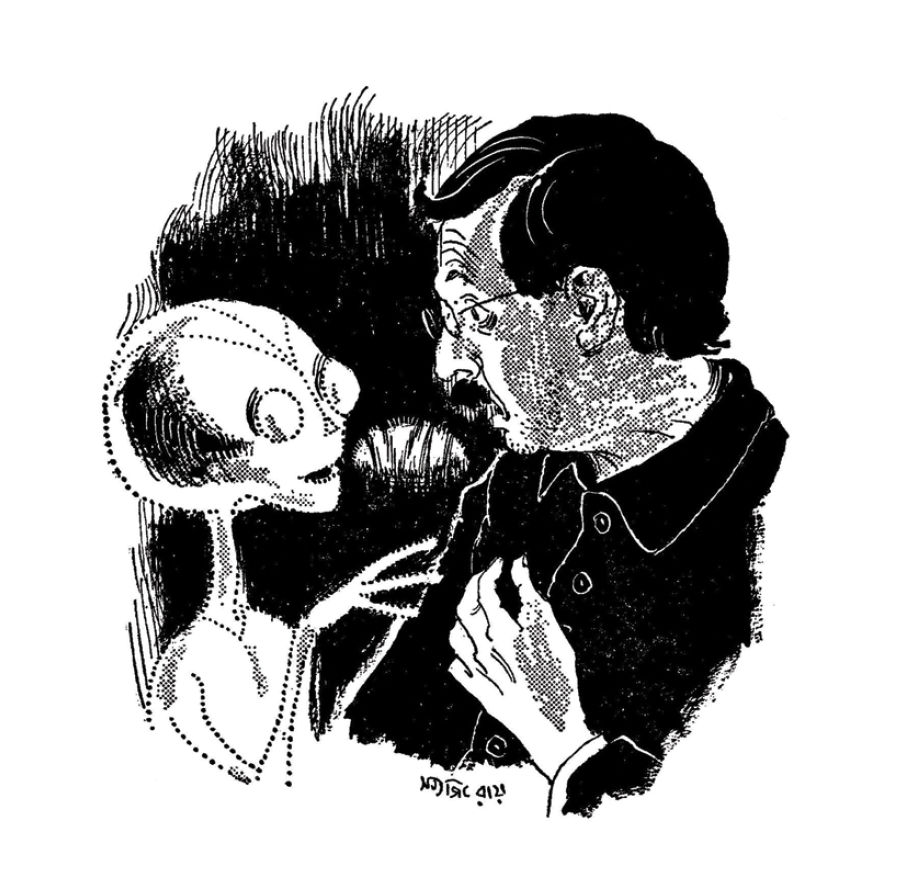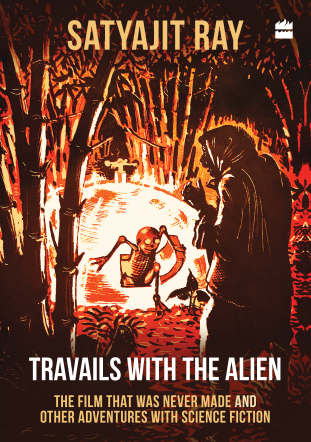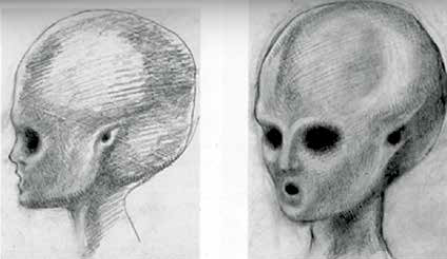Read excerpts of the sci-fi script by Satyajit Ray that never got made into a film
Essay ‘Science Fiction’
In this era of rapidly developing technology, science fiction is inevitably undergoing transformations. The old staples are being replaced by new ones, and the field is being constantly enriched by new breakthroughs in every branch of applied science. The laser beam, computer machines, space satellites, androids (which are robots in human forms), suspended animation—these are among common ingredients of contemporary science fiction.
The moon is now nearly out as a field of speculation. Invisibility and time travel have been proved scientifically unattainable, and have lost their status as staples. Robots are having a field day, but malevolent ones are frowned upon, as hostility is regarded as a psychological state which a machine is incapable of attaining. ESP or extrasensory perception is coming into its own, thanks to recent findings, and extraterrestrials are being freely endowed with the powers of hypnosis and telepathy.
…
But any story of human endeavour on a familiar terrestrial plane has to have the backing of scientific data. Rockets may soar into space but if they set out from the earth, and if they contain human beings, there is no other way to but treat the happenings in a factual, scientific way.
But this is not necessarily an inhibiting factor. For one thing, the imponderables of human behaviour are always there to set off against the cold predictability (barring accidents) of machines. For another, for the vast mass of lay readers, technology still has enough elements of fantasy in it. As long as a man himself has not sensed weightlessness, or felt the searing upthrust of the rocket or fathomed a fraction of the infinite complexities of a giant computer, for him the elements of wonder will persist in clinging to the very ideas.
It is this sense of wonder that science fiction thrives on, and will continue to do so as long as there are men willing to dip into a tale that will make him feel small in the face of the expanding universe, and let him share the triumph and the futility of men probing into spheres of darkness—in space, on earth, on an alien planet, or in his own mind and body.

***
Bonkubabu’s Friend
Bonkubabu noticed the beam only when he was midway into Poncha Ghosh’s bamboo grove. He wasn’t carrying any light. And as it was winter he had no fear that he would encounter snakes. Also, he was used to this route. Though most people did not take this road, Bonkubabu had often used it as a shortcut. In the last few minutes something had been bothering him. But he couldn’t pinpoint the exact source of his unease. Suddenly he realized there was no noise coming from the crickets. They had fallen completely silent. And that made all the difference. Usually the deeper he walked into the grove the chirpier they became. Today it was just the opposite. And hence this eerie atmosphere. Buy why? Had all the crickets gone to sleep?
Perplexed, he continued to walk and after twenty yards or so he noticed the light. At first, he thought perhaps there was a fire in the bamboo grove. Right in the middle of the grove, in the clearing near the small pond, a pink glow reflected on the nearby leaves, twigs and branches. And down below that, right on the pond the light glimmered. But it was no fire: It was a constant, still light.
Bonkubabu continued to walk.
In a while his ears began ringing. It was a sound which one cannot describe, somewhat like the sound you hear when your ears feel blocked. A loud buzzing noise. Though Bonkubabu shivered in fright, he continued to move on along the growth of the bamboo stems, thanks to his indomitable curiosity.
And suddenly he came upon a sight that opened his eyes wide in shock: an
upturned bowl almost covered the entire pond. A pink glow was emitting from this translucent giant body which reflected on the outside area as well.
Not even in his wildest dreams had Bonkubabu imagined such an extraordinary object.
After spending a few seconds in a daze, he noticed that though the object remained still, it seemed as if it wasn’t quite lifeless. There was a constant glimmer emitting from it. It looked as though the glass mound was slowly rising and falling, just as a human chest heaves when breathing.
To take a closer look, Bonkubabu stepped forward and suddenly he felt as though an electric current had passed through his body. Some unknown power had rendered him completely immobile. He was left with no strength. He could move neither forward nor backward.
After standing in this stiff position for a while Bonkubabu noticed that the object had gradually stopped “breathing” and the ear-splitting humming noise had stopped too. A second later, shattering the silence of the night, a very thin, piercing voice, almost human in sound, uttered: milipipping khruk …milipipping khruk…!
This startled Bonkubabu. What sort of a language was this? And where was this voice coming from? Where was the speaker concealed?
Bonkubabu’s heart jumped when the same voice spoke again.
“Who are you? Who are you?”
Oh dear, this was in English! Were the words being spoken to him?
Bonkubabu gulped and replied, “I’m Bonkubihari Dutta, sir, Bonkubihari Dutta.”
“Are you English? Are you English?” the voice continued.
“No, sir!” he shouted back. “Bengali, sir, a Bengali Kayastha.”
There was a distinct pause. Then the voice clearly said, “Namaskar!”

***
Alien—A Treatment
Scene 76. Interior. Night. Mohan’s bedroom.
MOHAN and KALYANI are in bed, awake. It is obvious that the shy young girl is having difficulty in restraining her newfound emotions.
“If you would only tell me what’s worrying you.” There is a slight tremor in her voice.
“I want things to fall in place,” says MOHAN, “and they refuse to.”
“It’s because you let your mind wander too much. You think of the moon and the stars and the zero and … and don’t think of me at all.”
(MOHAN turns to his wife and puts his arms around her.)
“Why should I think of you when you are right next to me? One worries about a mystery, about something one can’t quite understand. You are not a mystery to me!”
“I wish I were—if only to be a little more in your thoughts.”
“But you are in my thoughts now, Kalyani…”
“And may I know what those thoughts are?”
“They are thoughts which tell me not to think but to—”
(MOHAN takes KALYANI in a light embrace and kisses her warmly. Then he brings his face very close to hers and keeps looking into her eyes.)
“What is it you’re thinking again?” says KALYANI.
“I’m not thinking. I’m looking. I’m looking at a pond.”
“A lotus pond?”
“No, but it’s shaped like a lotus petal and it’s fringed by dark foliage. There’s a vast, round, mysterious temple in the pond which is shaped like a zero. There’s a very mischievous deity in it who can take a man’s mind off his work and—”
(MOHAN suddenly stops, frowns.)
“Stars!” he mutters.
“What stars?”
“Haba said something about stars.”
“And now you have to think of Haba,” says KALYANI in despair.
“But you don’t realize, Kalyani—sometimes a child has more wisdom than an—”
MOHAN suddenly sits up. “Where’s that paper?” he says, his eyes shining with excitement.
“What paper?”
“When did we read about that moving light? Yesterday! That means the light was
seen two nights ago, and the temple—”
(MOHAN springs out of bed and rushes out of the room barefooted. Through the mosquito net, we see KALYANI sit up with an annoyed pout, her hair falling loose about her equally bare shoulders.)
***
Excerpted with permission from Travails With The Alien: The Film That Was Never Made And Other Adventures With Science Fiction, Satyajit Ray, Harper Collins India
Price: Rs 699
The story behind the sci-fi film that Ray was to direct
In the 1960s Satyajit Ray wrote a screenplay for what would have been the first-of-its-kind sci-fi film to be made in India. It was called The Alien. The film was based on his own short story, “Bonkubabur Bandhu”.
On being prompted by Arthur C. Clarke, Ray sent the script to Columbia Pictures in Hollywood, who agreed to back it. But the film was never made.
The book contains Ray’s essay on the project, the script of The Alien, the short story on which the screenplay was based, correspondence between Ray and those who had shown interest in the making of the film, along with other details.


